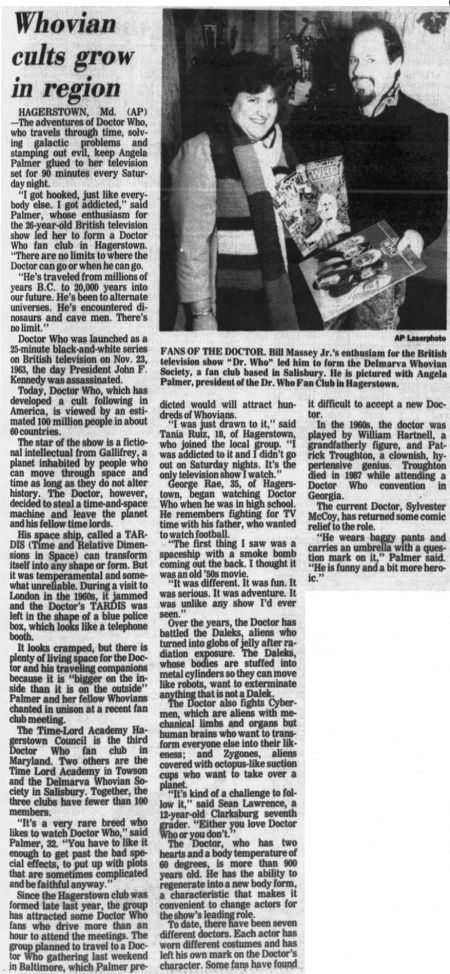Whovian cults grow in region
- Publication: The Daily Times
- Date: 1990-03-23
- Author:
- Page: 17
- Language: English
HAGERSTOWN, Md. (AP)—The adventures of Doctor Who, who travels through time, solving galactic problems and stamping out evil, keep Angela Palmer glued to her television set for 90 minutes every Saturday night.
"I got hooked, just like everybody else. I got addicted," said Palmer, whose enthusiasm for the 26-year-old British television show led her to form a Doctor Who fan club in Hagerstown. "There are no limits to where the Doctor can go or when he can go.
"He's traveled from millions of years B.C. to 20,000 years into our future. He's been to alternate universes. He's encountered dinosaurs and cave men. There's no limit."
Doctor Who was launched as a 25-minute black-and-white series on British television on Nov. 23, 1963, the day President John F. Kennedy was assassinated.
Today, Doctor Who, which has developed a cult following in America, is viewed by an estimated 100 million people in about 60 countries.
The star of the show is a fictional intellectual from Gallifrey, a planet inhabited by people who can move through space and time as long as they do not alter history. The Doctor, however, decided to steal a time-and-space machine and leave the planet and his fellow time lords.
His space ship, called a TARDIS (Time and Relative Dimensions in Space) can transform itself into any shape or form. But it was temperamental and somewhat unreliable. During a visit to London in the 1960s, it jammed and the Doctor's TARDIS was left in the shape of a blue police box, which looks like a telephone booth.
It looks cramped, but there is plenty of living space for the Doctor and his traveling companions because it is "bigger on the inside than it is on the outside" Palmer and her fellow Whovians chanted in unison at a recent fan club meeting.
The Time-Lord Academy Hagerstown Council is the third Doctor Who fan club in Maryland. Two others are the Time Lord Academy in Towson and the Delmarva Whovian Society in Salisbury. Together, the three clubs have fewer than 100 members.
"It's a very rare breed who likes to watch Doctor Who," said Palmer, 32. "You have to like it enough to get past the bad special effects, to put up with plots that are sometimes complicated and be faithful anyway."
Since the Hagerstown club was formed late last year, the group has attracted some Doctor Who fans who drive more than an hour to attend the meetings. The group planned to travel to a Doctor Who gathering last weekend in Baltimore, which Palmer predicted would will attract hundreds of Whovians.
"I was just drawn to it," said Tania Ruiz, 18, of Hagerstown, who joined the local group. "I was addicted to it and I didn't go out on Saturday nights. It's the only television show I watch."
George Rae, 35, of Hagerstown, began watching Doctor Who when he was in high school. He remembers fighting for TV time with his father, who wanted to watch football.
"The first thing I saw was a spaceship with a smoke bomb coming out the back. I thought it was an old '50s movie.
"It was different. It was fun. It was serious. It was adventure. It was unlike any show I'd ever seen."
Over the years, the Doctor has battled the Daleks, aliens who turned into globs of jelly after radiation exposure. The Daleks, whose bodies are stuffed into metal cylinders so they can move like robots, want to exterminate anything that is not a Dalek.
The Doctor also fights Cybermen, which are aliens with mechanical limbs and organs but human brains who want to transform everyone else into their likeness; and Zygones, aliens covered with octopus-like suction cups who want to take over a planet.
"It's kind of a challenge to follow it," said Sean Lawrence, a 12-year-old Clarksburg seventh grader. "Either you love Doctor Who or you don't."
The Doctor, who has two hearts and a body temperature of 60 degrees, is more than 900 years old. He has the ability to regenerate into a new body form, a characteristic that makes it convenient to change actors for the show's leading role.
To date, there have been seven different doctors. Each actor has worn different costumes and has left his own mark on the Doctor's character. Some fans have found it difficult to accept a new Doctor.
In the 1960s, the doctor was played by William Hartnell, a grandfatherly figure, and Patrick Troughton, a clownish, hypertensive genius. Troughton died in 1987 while attending a Doctor Who convention in Georgia.
The current Doctor, Sylvester McCoy, has returned some comic relief to the role.
"He wears baggy pants and carries an umbrella with a question mark on it," Palmer said. "He is funny and a bit more heroic."
Caption: FANS OF THE DOCTOR. Bill Massey Jr.'s enthusiam for the British television show "Dr. Who" led him to form the Delmarva Whovian Society, a fan club based in Salisbury. lie is pictured with Angela Palmer, president of the Dr. Who Fan Club in Hagerstown.
Disclaimer: These citations are created on-the-fly using primitive parsing techniques. You should double-check all citations. Send feedback to whovian@cuttingsarchive.org
- APA 6th ed.: (1990-03-23). Whovian cults grow in region. The Daily Times p. 17.
- MLA 7th ed.: "Whovian cults grow in region." The Daily Times [add city] 1990-03-23, 17. Print.
- Chicago 15th ed.: "Whovian cults grow in region." The Daily Times, edition, sec., 1990-03-23
- Turabian: "Whovian cults grow in region." The Daily Times, 1990-03-23, section, 17 edition.
- Wikipedia (this article): <ref>{{cite news| title=Whovian cults grow in region | url=http://cuttingsarchive.org/index.php/Whovian_cults_grow_in_region | work=The Daily Times | pages=17 | date=1990-03-23 | via=Doctor Who Cuttings Archive | accessdate=22 December 2025 }}</ref>
- Wikipedia (this page): <ref>{{cite web | title=Whovian cults grow in region | url=http://cuttingsarchive.org/index.php/Whovian_cults_grow_in_region | work=Doctor Who Cuttings Archive | accessdate=22 December 2025}}</ref>
